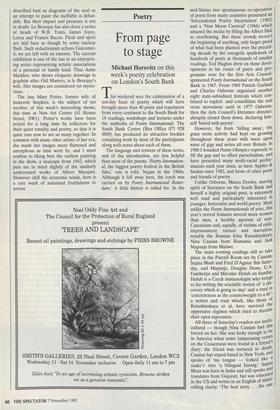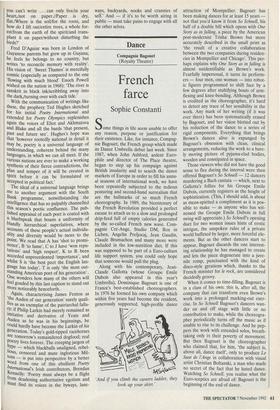Poetry
From page to stage
Michael Horovitz on this week's poetry celebration on London's South Bank
This weekend sees the culmination of a ten-day feast of poetry which will have brought more than 40 poets and translators from every continent to the South Bank for 18 readings, workshops and lectures under the umbrella of Poetry International. The South Bank Centre (Box Office 071 928 8800) has produced an attractive booklet containing work by most of the participants along with notes about each of them.
The language and content of these notes, and of the introduction, are less helpful than most of the poems. 'Poetry Internation- al, the biggest poetry festival in the British Isles,' one is told, 'began in the 1960s. Although it fell away here, the torch was carried on by Poetry International Rotter- dam.' A little history is called for. In the mid-Sixties two spontaneous co-operatives of poets from many countries presented an 'International Poetry Incarnation' (1965) and a 'New Moon Carnival' (1966) which amazed the media by filling the Albert Hall to overflowing. But these crowds weren't the beginning of anything, only larger proof of what had been planted over the preced- ing decade by the energetic spadework of hundreds of poets at thousands of smaller readings. Ted Hughes drew on these devel- opments in his roster of poets and pro- gramme note for the first Arts Council sponsored Poetry International on the South Bank in 1967. From 1969 Patrick Garland and Charles Osborne organised another eight state-subsidised festivals which con- tinued to exploit and consolidate the oral verse movement until in 1977 Osborne, then the Arts Council's literature director, abruptly closed them down, declaring him- self 'bored with poetry'.
However, far from 'falling away', the grass roots activity had kept on growing throughout these years with wave upon wave of gigs and series all over Britain. In 1980 I founded Poetry Olympics expressly to fill the gap and to offset parochialism, and have presented many multi-racial perfor- mances each year since, as have Apples 84 Snakes since 1982, and hosts of other poets and friends of poetry. Unlike Osborne, Maura Dooley, moving spirit of literature on the South Bank and herself a highly original poet, is extremelY well read and particularly interested in younger, heterodox and world poetry. Most unlike the Poetry Internationals of yore, this year's revival features several more women than men, a healthy quorum of non- Caucasians and, equally, of victims of exile, imprisonment, torture and starvation, notably the Russian Irina Ratushinskaya, Nina Cassian from Rumania and Jack Mapanje from Malawi. The main evening readings still to take place in the Purcell Room are by Cassian, Sujata Bhatt and Fred D'Aguiar this Satur- day, and Mapanje, Douglas Dunn, U.A. Fanthorpe and Miroslav Holub on Sunday. Holub is a Czech immunologist who brings to his writing the scientific notion of 'a dis- covery which is going to stay' and a trust In 'concreteness as the counterweight to a he a notion and trust which, like those of Ratushinskaya et al, have survived the oppressive regimes which tried to throttle their open expression. All three of Saturday's readers are multi- cultural — though Nina Cassian had this forced on her. She was lucky enough to be in America when some lampooning verses on the Ceaucescus were found in a friend s diary: the friend was tortured to death. Cassian has stayed based in New York, and speaks of 'my tongue — forked like a snake's' into 'a bilingual hissing.' SLIP°, Bhatt was born in India and still speaksand. translates from Gujarati, but was educated in the US and writes in an English of mind" stilling clarity: The best story . . . the one You can't write . . . can only live/in your heart,/not on paper.//Paper is dry, flat./Where is the soil/for the roots, and how do I lift out/entire trees, a whole for- est/from the earth of the spirit/and trans- plant it on paper/without disturbing the birds?'
Fred D'Aguiar was born in London of Guyanese parents but grew up in Guyana; he feels he belongs to no country, but writes 'to reconcile memory with reality'. His vision of 'Sweet Thames' is mercifully cosmic (especially as compared to the one 'flowing with much blood' Enoch Powell wished on the nation in 1968): 'The river is sanskrit in black ink/scribbling away into the dark,/turning over with each tide.' With the communication of writings like these, the prophecy Ted Hughes sketched for his initial Poetry International and extended for Poetry Olympics replenishes again the voices of Eliot and Akhmatova and Blake and all the bards 'that present, past and future see'. Hughes's hope was that 'however rootedly national in detail it may be, poetry is a universal language of understanding, coherent behind the many languages, in which we can all meet. If the various nations are ever to make a working Synthesis of their fierce contradictions, the plan and temper of it will be created in Spirit before it can be formulated or accepted in political fact.' The ideal of a universal language brings me to another argument with the South Bank programme, notwithstanding the intelligence that has so palpably channelled this season's poetic confluence. The pub- lished appraisal of each poet is coated with a blurbspeak that boasts a uniformity of blandly hierarchical superlatives, where accounts of these people's actual individu- ality and diversity would be more to the point. We read that A has 'shot to promi- nence', B 'to fame', C to J have 'won repu- tations' and 'high respect', K to R been accorded unprecedented 'importance', and Whilst S is 'the best poet the English lan- guage has today', T is only 'the most out- standing American poet of his generation'. One wonders how many of the others will feel goaded by this last caption to stand out more noticeably henceforth. Again, characterising James Fenton as the Auden of our generation' surely quali- ftes. as an exemplar of the patriarchal falla- ey:. if Philip Larkin had merely remained as imitative and derivative of Yeats and Auden as he was in his beginnings, he could hardly have become the Larkin of his generation. Today's gold-tipped racehorses are tomorrow's remaindered dogfood; real Poetry lives forever. The creeping jargon of hype — which blackballs unaligned, rebel- lions, censored and mute inglorious Mil- tons is put into perspective by a better word from one of this ebullient Poetry International's Irish contributors, Brendan Kennelly: 'Poetry must always be a flight from deadening authoritative egotism and Must find its voices in the byways, lane- ways, backyards, nooks and crannies of self.' And — if it's to be worth airing in public — must take pains to engage with all the other selves.











































































 Previous page
Previous page